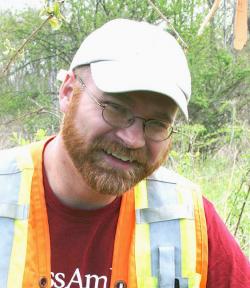
Rick Harper’s enthusiasm and passion for trees – and educating others about them – is contagious. Since August 2012, he has occupied a newly-created extension faculty position in the Department of Environmental Conservation at the University of Massachusetts Amherst.
As Extension Assistant Professor of Urban & Community Forestry, Harper’s position involves a three-way “split” of teaching, research and extension. That means that at certain periods in the year he may be spending considerable time in the classroom instructing urban forestry/arboriculture students on the UMass campus, or that he may be traveling to Extension programs throughout Massachusetts - and North America – reaching adult audiences with lectures and hands-on activities about the management and stewardship of urban trees.
In addition to these teaching activities, Harper is currently involved in coordinating and leading four integrated research and extension projects that range from examining the performance of urban deciduous trees (i.e., oak, elm) as well as their coniferous (i.e., hemlock) counterparts. “My hope is that our research would contribute to the long-term understanding of urban trees, and how to help create environments that foster success for our urban plantings. Urban trees, after all, help to not only beautify our towns and cities, but to add important ecosystem and economic benefit to our communities” says Harper.
As part of his Extension responsibilities, Harper administers a monthly, 60-minute noonhour webcast titled ‘Urban Forestry Today’. As part of this initiative, he recruits expert speakers from other academic institutions and the industry to discuss the latest research and practice pertaining to the management of our urban tree resource. In response to this program, an audience of 200 practitioners and academics from across the U.S., Canada, and Europe routinely attend these live broadcasts that are also archived at his website: http://www.urbanforestrytoday.org/ “A big drawing-point for these webcasts are the professional continuing education credits that they offer both to certified arborists that attend “live”, and to those that watch the archived edition” says Harper.
Shortly after commencing his position at UMass, he noted that both business and non-profit urban forestry stakeholders expressed interest in offering internship opportunities for young and promising student scholars. At the same time, he also observed student interest related to working in the community and gaining experience in environmental conservation projects. He initiated the ‘Connecting Students with Stakeholders’ initiative where he successfully links interested students with off-campus internship opportunities for independent study credit, work experience, and even income and publication opportunities. Since its inception in 2014, this initiative has directed seven students through specific civic engagement opportunities that have ranged from working with community wood banks to provide fuel for local residents (including low-income individuals), to working with local small business and non-profit leaders in underserved communities.
Community partnerships
Massachusetts has a very active professional and volunteer-based network of urban forestry associations and Harper takes the opportunity to be involved with many of them. He currently serves and provides leadership on the following Boards of Directors: Massachusetts Tree Wardens and Foresters Association (Advisor), ReGreen Springfield (Ex-officio member), New England International Society of Arboriculture Board of Directors (Vice-President), as well as the US Forest Service 'Urban Forest Strike Steam' Advisory Board.
Recognizing his outstanding work, Harper has received two awards since arriving at UMass: the President’s Award by the Mass. Tree Wardens and Foresters Association and an ‘Award of Achievement’ by the International Society of Arboriculture (ISA) for his popular webcasts. With nearly 25,000 members, ISA is the largest arboricultural/urban forestry association in the world.
From the classroom, to the boardroom, to the urban forest, Harper feels fortunate to be in a job he loves that enables him to reach others with the good news about trees and their benefits.